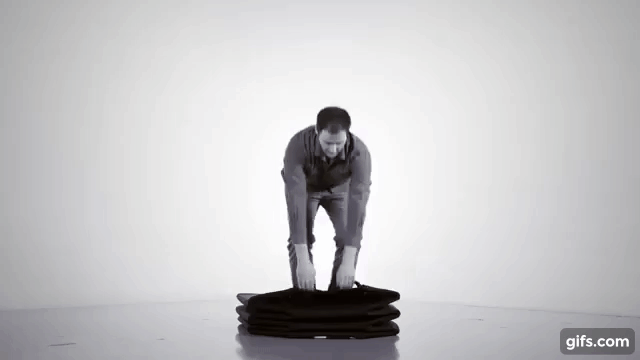Stress Positions
Say what you will about “Stress Positions,” the new indie comedy that marks the feature debut of writer-director-costar Theda Hammel: it's not overly consumed with coming across as likable to potential viewers. Not only does it take us back to the early days of COVID-19 (an era that many audiences may not feel particularly inclined to revisit, especially in the context of a comedy) but populates its narrative with some of the most spectacularly solipsistic and generally irritating characters imaginable. As approaches go, this is undeniably chancy, I suppose. Still, while some viewers may find her willingness to go to such extremes impressive, I suspect that many more will find themselves driven to the exits. Set over the spring and summer of 2020, the film centers on Terry (John Early), a guy who is hoping to ride things out in a Brooklyn brownstone belonging to ex-husband Leo (John Roberts) along with Bahlul (Qaher Harhash), his 19-year-old Moroccan nephew who works as a male model and has been laid up with a broken leg after being injured in a scooter accident. Terry takes his determination to protect himself and Bahlul from the potential horrors of the outside world to grand extremes: Spraying virtually every surface with an endless supply of Lysol, and removing every trace of the apartment’s long and lurid history as Leo’s chief party place. He also tries to keep potential visitors—save for the maskless MAGA neighbor who can fix the wi-fi and the GrubHub courier who is a regular fixture—away by insisting that the newcomer is too badly injured to have guests coming by. Of course, the news that Terry has a handsome and mysterious male model sequestered in his apartment is just the thing to raise the curiosity of those in his orbit. Before long, his best (and possibly only) friend, trans lesbian Karla (Hammel), turns up to check out the newcomer and to take a break from her wife, Vanessa (Amy Zimmer), an author who essentially stole the details of Karla’s life for her first novel and who is now struggling to come up with a follow-up. While Terry becomes increasingly frustrated and paranoid—not to mention injured after slipping on a piece of raw chicken—Karla does everything she can to befriend Bahlul and to help him figure out who he is. Their respective jobs become excessively complicated when Leo unexpectedly arrives with his new fiancé and others, all of whom have become consumed with the notion of meeting Terry’s mysterious guest for themselves. Some of the early going is quite funny, as Hammel starts things off in a cheerfully goofy tone. Terry’s determination to bang his pots and pans to support frontline workers without interrupting his latest rant is especially amusing. I also liked how the people in Terry's proximity try to curry favor from Bahlul in ways that only serve to underline their blinkered and occasionally racist perspectives. Karla tries to ingratiate herself by playing up her dubious Mediterranean heritage, Vanessa talks about the horrors of being forced to grow up around “blondes." While everyone is willing to talk about the evils and intolerant nature of all things American (in Terry’s case, presumably as a way of atoning for his bout of post-9/11 conservatism), none of them appear even to know if Morocco is part of the Middle East or not. This is funny to a point, but the problem with “Stress Positions” is that said point arrives about halfway through. The runtime that remains gets overloaded with too many plot threads, characters, and repeated punchlines, Hammel essentially turning the proceedings into a failed exercise in Blake Edwards-style farce. Another problem is the inescapable fact that nearly all the characters seem to outdo each other in self-absorption and general awfulness without making them interesting. The only one who escapes this is Bahlul; perhaps the funniest and subtlest running joke is the way he quietly suggests that these people fawning for his attention are not nearly as special or exciting as they think. If the film concentrated more on this and less on the increasingly chaotic proceedings on display, it might have become more than an endless litany of smug obnoxiousness.


Say what you will about “Stress Positions,” the new indie comedy that marks the feature debut of writer-director-costar Theda Hammel: it's not overly consumed with coming across as likable to potential viewers. Not only does it take us back to the early days of COVID-19 (an era that many audiences may not feel particularly inclined to revisit, especially in the context of a comedy) but populates its narrative with some of the most spectacularly solipsistic and generally irritating characters imaginable. As approaches go, this is undeniably chancy, I suppose. Still, while some viewers may find her willingness to go to such extremes impressive, I suspect that many more will find themselves driven to the exits.
Set over the spring and summer of 2020, the film centers on Terry (John Early), a guy who is hoping to ride things out in a Brooklyn brownstone belonging to ex-husband Leo (John Roberts) along with Bahlul (Qaher Harhash), his 19-year-old Moroccan nephew who works as a male model and has been laid up with a broken leg after being injured in a scooter accident. Terry takes his determination to protect himself and Bahlul from the potential horrors of the outside world to grand extremes: Spraying virtually every surface with an endless supply of Lysol, and removing every trace of the apartment’s long and lurid history as Leo’s chief party place. He also tries to keep potential visitors—save for the maskless MAGA neighbor who can fix the wi-fi and the GrubHub courier who is a regular fixture—away by insisting that the newcomer is too badly injured to have guests coming by.
Of course, the news that Terry has a handsome and mysterious male model sequestered in his apartment is just the thing to raise the curiosity of those in his orbit. Before long, his best (and possibly only) friend, trans lesbian Karla (Hammel), turns up to check out the newcomer and to take a break from her wife, Vanessa (Amy Zimmer), an author who essentially stole the details of Karla’s life for her first novel and who is now struggling to come up with a follow-up. While Terry becomes increasingly frustrated and paranoid—not to mention injured after slipping on a piece of raw chicken—Karla does everything she can to befriend Bahlul and to help him figure out who he is. Their respective jobs become excessively complicated when Leo unexpectedly arrives with his new fiancé and others, all of whom have become consumed with the notion of meeting Terry’s mysterious guest for themselves.
Some of the early going is quite funny, as Hammel starts things off in a cheerfully goofy tone. Terry’s determination to bang his pots and pans to support frontline workers without interrupting his latest rant is especially amusing. I also liked how the people in Terry's proximity try to curry favor from Bahlul in ways that only serve to underline their blinkered and occasionally racist perspectives. Karla tries to ingratiate herself by playing up her dubious Mediterranean heritage, Vanessa talks about the horrors of being forced to grow up around “blondes." While everyone is willing to talk about the evils and intolerant nature of all things American (in Terry’s case, presumably as a way of atoning for his bout of post-9/11 conservatism), none of them appear even to know if Morocco is part of the Middle East or not.
This is funny to a point, but the problem with “Stress Positions” is that said point arrives about halfway through. The runtime that remains gets overloaded with too many plot threads, characters, and repeated punchlines, Hammel essentially turning the proceedings into a failed exercise in Blake Edwards-style farce.
Another problem is the inescapable fact that nearly all the characters seem to outdo each other in self-absorption and general awfulness without making them interesting. The only one who escapes this is Bahlul; perhaps the funniest and subtlest running joke is the way he quietly suggests that these people fawning for his attention are not nearly as special or exciting as they think. If the film concentrated more on this and less on the increasingly chaotic proceedings on display, it might have become more than an endless litany of smug obnoxiousness.



















